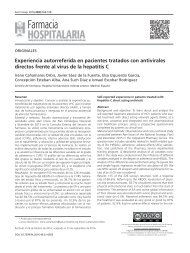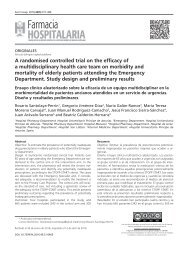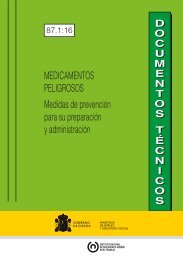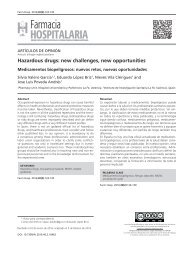IPT-aripiprazol-depot-abilify-maintena
IPT-aripiprazol-depot-abilify-maintena
IPT-aripiprazol-depot-abilify-maintena
Create successful ePaper yourself
Turn your PDF publications into a flip-book with our unique Google optimized e-Paper software.
El paso de la formulación oral a la <strong>depot</strong> quedará limitado a los<br />
pacientes en los que debido a la falta de cumplimiento terapéutico y<br />
al riesgo potencial de recaída, el <strong>aripiprazol</strong> por vía oral no es una<br />
opción idónea, siempre que se administre en el contexto de un<br />
programa específico de adherencia terapéutica.<br />
Respecto a la seguridad, los efectos adversos relacionados con el<br />
lugar de inyección representan un inconveniente respecto a la<br />
administración oral. El incremento tanto de los síntomas<br />
extrapiramidales como de los casos de leucopenia observados con la<br />
formulación <strong>depot</strong> podría representar un riesgo potencial añadido,<br />
por lo que se monitorizarán a largo plazo. Asimismo, también se<br />
realizará seguimiento de los acontecimientos adversos menos<br />
frecuentes ya que, debido al número limitado de pacientes<br />
estudiados, es posible que efectos adversos de baja incidencia no<br />
hayan sido detectados.<br />
CONCLUSIÓN<br />
Aripiprazol IM <strong>depot</strong>, al igual que otras formulaciones <strong>depot</strong>,<br />
está destinado a pacientes con esquizofrenia en los que el<br />
tratamiento crónico con la forma oral no es una opción idónea por la<br />
falta de cumplimiento terapéutico y riesgo potencial de recaída,<br />
siempre que se administre en el contexto de un programa específico<br />
de adherencia terapéutica. La valoración del <strong>aripiprazol</strong> como<br />
tratamiento oral deberá considerar las posibles alternativas de<br />
acuerdo a las recomendaciones de las guías terapéuticas, si bien, de<br />
manera general, <strong>aripiprazol</strong> oral no es tratamiento de elección en la<br />
esquizofrenia.<br />
Aripiprazol <strong>depot</strong> ha demostrado una eficacia similar a la<br />
observada con la formulación oral a las dosis autorizadas. No se<br />
dispone de comparaciones directas frente a otros antipsicóticos<br />
<strong>depot</strong>.<br />
Los efectos adversos en el lugar de administración y algunas<br />
incertidumbres respecto a su seguridad representan sus principales<br />
limitaciones respecto a la formulación oral.<br />
Debe señalarse la falta de evidencia que sustenta el uso de<br />
asociaciones antipsicóticas, junto con los riesgos derivados de dichas<br />
asociaciones (mayor grado de incumplimiento, riesgo de<br />
interacciones, incremento de efectos adversos, disfunción cognitiva<br />
y mortalidad).<br />
CONSIDERACIONES FINALES DEL GCPT<br />
El coste de <strong>aripiprazol</strong> <strong>depot</strong> es el doble o el triple, dependiendo<br />
de la dosis utilizada, que el del <strong>aripiprazol</strong> oral. En comparación<br />
con otros <strong>depot</strong>, <strong>aripiprazol</strong> tiene un coste muy superior a<br />
flufenazina <strong>depot</strong> y a zuclopentixol <strong>depot</strong> y menor que risperidona y<br />
paliperidona, salvo cuando estos últimos se utilizan a dosis bajas.<br />
REFERENCIAS<br />
1. Tandon R, et al. Definition and description of schizoprenia in the<br />
DSM-5. Schizophr Res 2013.<br />
http://dx.doi.org/10.1016/j.schres.2013.05.028<br />
2. Tandon, R., M. S. Keshavan and H. A. Nasrallah. Schizophrenia,<br />
"just the facts" what we know in 2008. 2. Epidemiology and<br />
etiology." Schizophr Res 2008; 102(1-3): 1-18<br />
3. Ayuso-Mateos, J.L. et al. Estimating the prevalence of<br />
schizophrenia in Spain using a disease model. Schizophrenia<br />
Research. 2006; 86, 194–201<br />
4. Julio C. Martín García-Sancho (coordinador) Guia Práctica<br />
Clínica para el tratamiento de la esquizofrenia en centros de salud<br />
mental. Subdirección de Salud Mental. Servicio Murciano de Salud.<br />
Junio, 2009. Disponible en:<br />
http://www.guiasalud.es/GPC/GPC_443_Esquizofrenia_Murcia.pdf<br />
5. Saha S, Chant D, McGrath J. A systematic review of mortality in<br />
schizophrenia: is the differential mortality gap worsening over time?<br />
Arch Gen Psychiatry 2007; 64(10): 1123-31.<br />
6. Davis JM1, Chen N, Glick ID. A meta-analysis of the efficacy of<br />
second-generation antipsychotics. Arch Gen Psychiatry. 2003; 60 (6)<br />
553-64.<br />
7. Leucht S, Cipriani A, Spineli L, et al. Comparative efficacy and<br />
tolerability of 15 antipsychotic drugs in schizophrenia: a multipletreatment<br />
meta-analysis. Lancet 2013; 382: 951.62.<br />
8. Lieberman JA, Stroup TS, McEvoy JP, et al. Clinical<br />
Antipsychotic Trials of Intervention Effectiveness (CATIE)<br />
Investigators. Effectiveness of antipsychotic drugs in patients with<br />
chronic schizophrenia. N Engl J Med. 2005 Sep 22; 353 (12): 1209-<br />
23.<br />
9. Jones PB, Barnes TR, Davies L, et al. Controlled Trial of the<br />
Effect on Quality of Life of Second- vs First-Generation<br />
Antipsychotic Drugs in Schizophrenia. Cost Utility of the Latest<br />
Antipsychotic Drugs in Schizophrenia Study (CUtLASS 1). Arch<br />
Gen Psychiatry. 2006; 63: 1079-1087.<br />
10. Laursen TM, Munk-Olsen T, Nordentoft M. Increased mortality<br />
among patients admitted with major psychiatric disorders: a registerbased<br />
study comparing mortality in unipolar depressive disorder,<br />
bipolar affective disorder, schizoaffective disorder, and<br />
schizophrenia. J Clin Psychiatry. 2007;68:899–907.<br />
11. Kreyenbuhl J, Buchanan R, Dickerson FB, Dixon LB. The<br />
Schizophrenia Patient Outcomes Research Team (PORT): updated<br />
treatment recommendations 2009. Schizophr Bull 2010;36:94–103.<br />
12. Kane JM, Kishimoto T, Correll CU. Assessing the comparative<br />
effectiveness of long-acting injectable vs. oral antipsychotic<br />
medications in the prevention of relapse provides a case study in<br />
comparative effectiveness research in psychiatry. J Clin Epidemiol.<br />
2013; 66(8 Suppl):S37-41.<br />
13. Kishimoto T1, Robenzadeh A, Leucht C, et al. Long-acting<br />
injectable vs oral antipsychotics for relapse prevention in<br />
schizophrenia: a meta-analysis of randomized trials. Schizophr Bull.<br />
2014; 40 (1): 192-213.<br />
14. Scottish Intercollegiate Guidelines Network (SIGN).<br />
Management of schizophrenia. Edinburgh: SIGN; 2013. (SIGN<br />
publication no. 131). [March 2013]. Disponible en:<br />
http://www.sign.ac.uk<br />
15. Olfson M1, Marcus SC, Ascher-Svanum H Treatment of<br />
schizophrenia with long-acting fluphenazine, haloperidol, or<br />
risperidone. Schizophr Bull. 2007;33(6):1379-87.<br />
16. National Institute for Health and Clinical Excellence (2009).<br />
Schizophrenia: Core interventions in the treatment and management<br />
of schizophrenia in primary and secondary care (update), National<br />
Clinical Practice Guideline Number 82. National Collaborating<br />
Centre for Mental Health Commissioned by the National Institute for<br />
Health and Clinical Excellence. Disponible en:<br />
http://www.nice.org.uk/guidance/cg82<br />
17. Clinical investigation of medicinal products, including <strong>depot</strong><br />
preparations in the treatment of schizophrenia. CHMP/40072/2010<br />
Rev. 1 October 2012. Disponible en:<br />
Página 4 de 5








